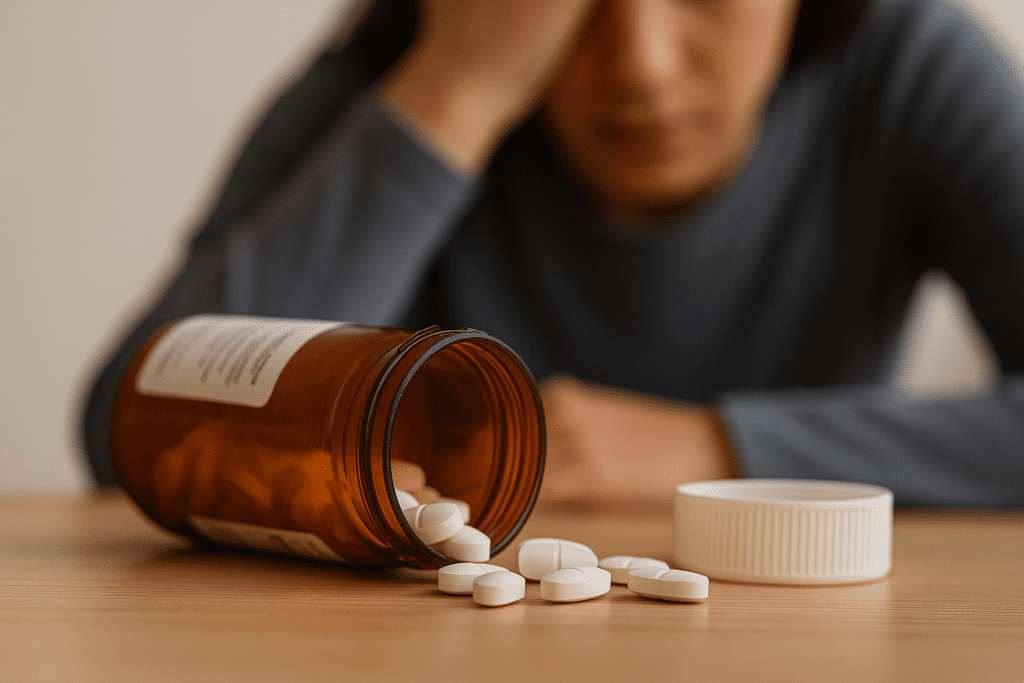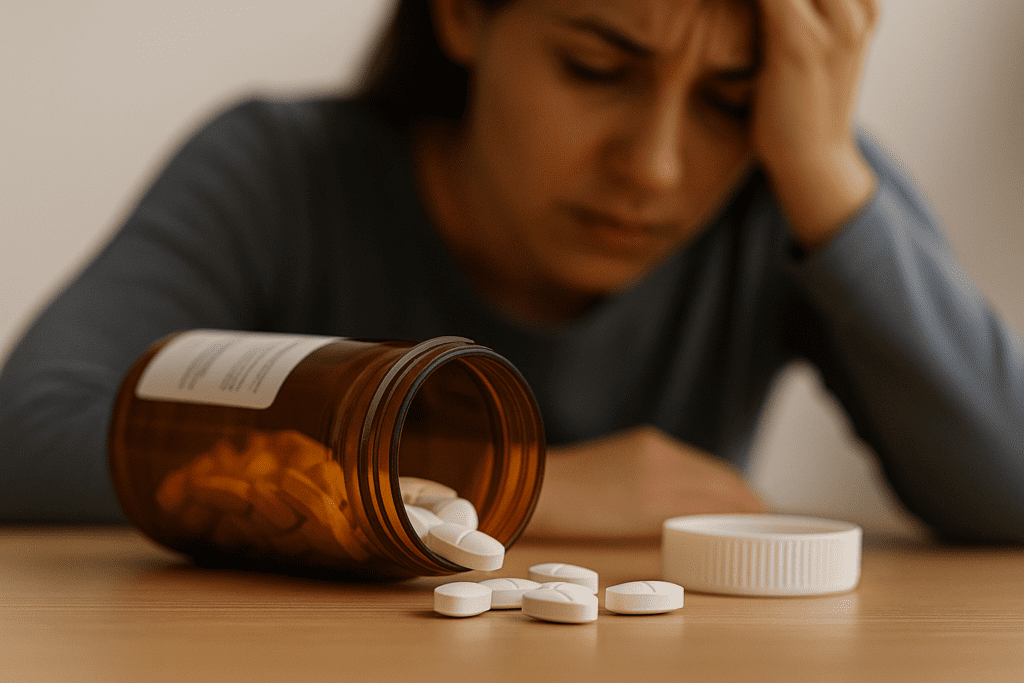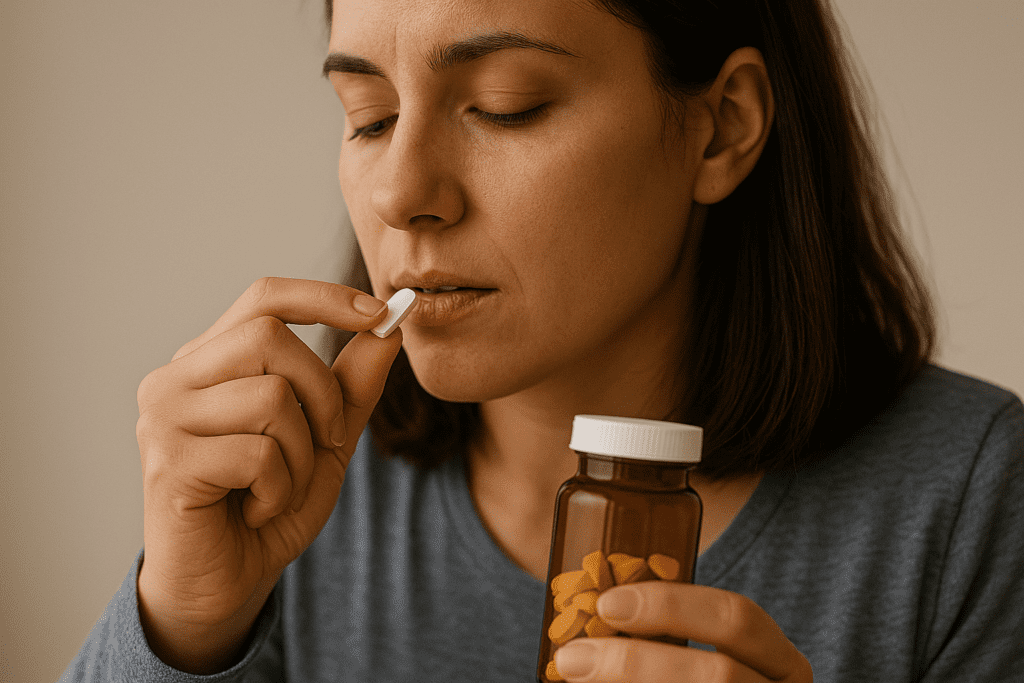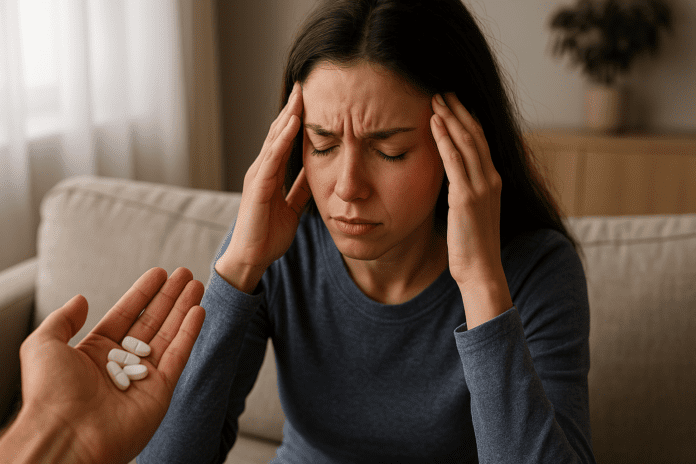In today’s high-pressure world, where the demands of work, relationships, and daily responsibilities weigh heavily on millions, the search for quick and reliable relief from mental and emotional strain is more intense than ever. Among the most sought-after solutions are stress pills and anxiety and stress relief pills—over-the-counter supplements or prescription medications that promise to take the edge off and help individuals regain a sense of calm. But as their popularity grows, so too do the questions surrounding their true effectiveness, safety, and long-term value. Do these stress relief pills genuinely work, or are they just modern-day placebos dressed in scientific marketing? And perhaps more importantly, what should consumers know to use these products safely and effectively without jeopardizing their mental or physical health?
You may also like: Proven Relaxation Techniques for Stress and Anxiety: Evidence-Based Strategies to Calm Your Mind and Body
Understanding the Appeal of Stress and Anxiety Relief Pills
Stress pills appeal to a fundamental human desire: the wish to feel better quickly and effortlessly. For those who experience chronic anxiety, restlessness, or fatigue stemming from emotional overload, the idea of swallowing a capsule and feeling relief within minutes is deeply attractive. Stress tablets and supplements often advertise benefits such as promoting relaxation, improving sleep quality, supporting mood balance, and reducing nervous tension. These promises speak directly to the pain points of modern life, making them especially alluring to individuals seeking a break from their daily pressures.
In addition, stress relief pills are often perceived as safer or more natural alternatives to traditional psychiatric medications. Many are marketed as herbal or non-addictive solutions, free from the side effects that accompany prescription drugs. The rise of wellness culture, which encourages self-care through natural and holistic means, has further amplified their appeal. Yet, the simplicity of popping a pill often conceals the complex pharmacological and psychological mechanisms that govern how these substances interact with the body and mind.
What’s in a Stress Relief Pill? Common Ingredients and How They Work
To assess whether stress relief pills work, it’s essential to understand what they contain. Ingredients vary widely depending on whether the product is a supplement, a natural remedy, or a prescription medication. Common elements in over-the-counter stress tablets include adaptogens like ashwagandha and Rhodiola rosea, amino acids such as L-theanine and GABA (gamma-aminobutyric acid), and herbal extracts including valerian root, chamomile, and passionflower. Each of these compounds is believed to support relaxation and emotional regulation through different mechanisms.
Ashwagandha, for instance, is an adaptogenic herb known for its ability to help the body modulate its stress response. Studies suggest that it may reduce cortisol levels, the primary hormone released during stress, thereby easing feelings of anxiety and fatigue. Similarly, L-theanine—an amino acid found in green tea—is thought to promote alpha brain wave activity, which is associated with a relaxed but alert mental state. GABA, a naturally occurring neurotransmitter, plays a key role in calming neural activity and is often included in stress pills to support relaxation without drowsiness.
Prescription medications used for stress and anxiety relief, such as selective serotonin reuptake inhibitors (SSRIs), benzodiazepines, and beta-blockers, operate on a different level. These drugs modulate neurotransmitter activity in the brain to regulate mood, decrease physiological symptoms of anxiety, and improve emotional stability. While highly effective for some individuals, they also carry risks, including dependency, tolerance, and a range of side effects that must be carefully managed.
Scientific Evidence: Do Stress Relief Pills Actually Work?
One of the most pressing questions consumers have is whether stress pills deliver on their promises. The answer is nuanced. Some ingredients found in stress tablets do have scientific backing. For example, clinical studies on ashwagandha have shown statistically significant reductions in stress and anxiety symptoms among participants compared to placebo groups. L-theanine has also demonstrated measurable effects on heart rate variability and subjective stress scores in controlled trials.
However, the overall quality of evidence varies considerably. Many studies are small, short-term, or funded by manufacturers, which introduces the potential for bias. Furthermore, the effects of many natural compounds are modest at best when compared to placebo. This doesn’t mean they are ineffective—it suggests that while some individuals may benefit, others may notice little to no improvement. Variables such as dosage, product quality, individual biochemistry, and coexisting mental health conditions all influence outcomes.
When it comes to prescription medications, the evidence base is much stronger. SSRIs and benzodiazepines, for instance, are extensively studied and widely used in clinical settings. Their effectiveness in treating generalized anxiety disorder, panic disorder, and social anxiety is well documented. However, these medications are typically prescribed when symptoms are moderate to severe and interfere significantly with daily life. For milder stress or situational anxiety, doctors often recommend lifestyle changes or behavioral therapies before turning to pharmacological interventions.

Placebo Effects and the Psychology of Taking a Pill
An important, yet often overlooked, aspect of using stress relief pills is the placebo effect—the psychological benefit derived from believing that a treatment is effective, regardless of its actual pharmacological impact. Numerous studies have shown that simply taking a pill believed to relieve stress can lead to real, measurable improvements in mood, heart rate, and subjective feelings of relaxation. This doesn’t invalidate the experience of relief; rather, it underscores the powerful connection between mind and body.
The act of taking a stress pill can also serve as a ritual, signaling to the brain that it’s time to shift gears and relax. This mental cue can initiate a cascade of physiological changes, including reduced sympathetic nervous system activity and lower cortisol output. In this way, even if the pill itself has minimal active ingredients, the context in which it is taken can significantly influence its effectiveness. Understanding the placebo effect can help individuals make more informed decisions about their treatment options and recognize the potential value of psychological mechanisms in stress reduction.
Safety Considerations: Potential Risks and Interactions
While stress relief pills are often perceived as harmless, they are not without risk. Natural does not always mean safe, especially when supplements are used improperly or in combination with other medications. Certain herbs and compounds can interact with prescription drugs, potentially leading to dangerous side effects. For example, St. John’s wort, sometimes found in stress tablets, can interfere with the metabolism of antidepressants, birth control pills, and blood thinners.
Additionally, not all products on the market are created equal. The supplement industry is not regulated as stringently as pharmaceuticals, which means product quality and ingredient purity can vary widely. Some supplements may contain more or less of an active ingredient than the label suggests, while others may be contaminated with heavy metals, pesticides, or undeclared drugs. Choosing reputable brands that conduct third-party testing is essential for minimizing health risks.
Prescription medications, while subject to stricter regulations, also carry potential downsides. Benzodiazepines, though effective for short-term relief, are associated with dependency, tolerance, and withdrawal symptoms if used for extended periods. SSRIs, on the other hand, can cause side effects such as nausea, weight changes, sexual dysfunction, and emotional blunting. It’s crucial to work with a qualified healthcare provider to determine the most appropriate treatment plan based on individual needs, risks, and goals.
The Role of Lifestyle: When Pills Aren’t Enough
It’s important to recognize that stress and anxiety are multifaceted conditions influenced by lifestyle, environment, and internal thought patterns. While stress relief pills may provide temporary reprieve, they rarely address the root causes of chronic stress. For lasting improvement, a more comprehensive approach is often necessary—one that includes behavioral changes, cognitive tools, and social support.
Exercise, for instance, has been repeatedly shown to reduce anxiety symptoms by promoting the release of endorphins and improving sleep quality. Mindfulness practices like meditation and yoga can help regulate the autonomic nervous system, reducing the physiological arousal that accompanies stress. Even simple changes, such as maintaining a consistent sleep schedule, limiting caffeine intake, and engaging in meaningful social activities, can have a profound effect on emotional well-being.
Cognitive-behavioral therapy (CBT) is another evidence-based approach that helps individuals identify and reframe negative thought patterns that contribute to anxiety. Unlike stress tablets, which typically offer symptom relief, CBT equips individuals with long-term coping strategies that can lead to lasting change. When used in combination with medication or supplements, behavioral therapies can enhance outcomes and reduce the likelihood of relapse.
Consumer Awareness: Reading Labels and Asking the Right Questions
Navigating the world of stress and anxiety relief pills requires a healthy dose of skepticism and informed decision-making. Labels can be misleading, and marketing language often exaggerates benefits while downplaying risks. Consumers should be proactive in researching ingredients, checking for clinical evidence, and evaluating product transparency.
Questions to consider include: Is this product third-party tested? Are the dosages of active ingredients consistent with those used in clinical studies? Does the company provide clear information about potential side effects or drug interactions? Are the claims supported by peer-reviewed research, or are they primarily anecdotal? Being an informed consumer means looking beyond the glossy packaging and understanding the science—or lack thereof—behind each pill.
It’s also worth consulting with a healthcare provider before starting any new supplement, particularly if one is already taking prescription medications or managing a chronic health condition. Pharmacists, too, can be valuable resources for assessing product safety and identifying potential interactions. By taking a proactive and inquisitive approach, individuals can better protect their health and make choices that align with their unique needs and values.

Frequently Asked Questions: Do Stress Relief Pills Really Work?
1. Can stress relief pills help manage work-related burnout or are they only for general anxiety?
While stress pills are commonly used for generalized anxiety, their role in addressing work-related burnout is gaining attention. Burnout is often accompanied by emotional exhaustion, reduced performance, and even physical symptoms like headaches and insomnia. Certain stress relief pills that include adaptogens or amino acids may help modulate the body’s stress response and support energy levels. However, stress tablets alone cannot resolve the systemic or environmental causes of burnout. A more effective strategy combines anxiety and stress relief pills with lifestyle modifications, boundary-setting at work, and therapeutic interventions focused on emotional recovery.
2. Are there any long-term risks of using stress tablets regularly, even if they’re labeled as natural?
Even when labeled as natural, consistent long-term use of stress tablets can pose risks if not properly monitored. Some herbal compounds, such as kava or valerian root, can lead to liver toxicity or interfere with liver enzyme metabolism when taken in excess. Moreover, overuse of amino acids like GABA may downregulate the body’s natural production of calming neurotransmitters. While anxiety and stress relief pills can be beneficial during acute periods of distress, rotating supplements and integrating non-pill coping strategies can prevent dependency. Consulting with a functional medicine practitioner or naturopathic doctor can also help tailor supplement cycles to individual needs.
3. How do stress relief pills compare to nutritional strategies for managing anxiety?
There is a growing field of research exploring the gut-brain axis and how dietary choices influence mood and stress resilience. Unlike stress pills that often deliver isolated compounds, nutrient-rich foods support neurotransmitter production through synergistic interactions. For instance, magnesium, B-complex vitamins, and omega-3 fatty acids have been shown to reduce symptoms of anxiety and improve cognitive resilience under pressure. While stress tablets may offer immediate symptom relief, nutritional strategies often contribute to foundational brain health and long-term emotional stability. The best results typically come from combining anxiety and stress relief pills with a nutrient-dense, anti-inflammatory diet.
4. Do stress tablets work differently for people with hormonal imbalances, such as during PMS or menopause?
Hormonal fluctuations significantly affect the way individuals experience and process stress. During phases like PMS or menopause, estrogen and progesterone shifts can amplify anxiety, irritability, and sleep disturbances. Certain stress tablets formulated with phytoestrogens or hormone-modulating adaptogens, such as maca or dong quai, may be more effective for these populations. However, it’s essential to select stress relief pills designed specifically for hormonal balance and avoid generic blends that may not address root hormonal patterns. A personalized approach, ideally involving hormone level testing, offers the most targeted relief when pairing hormonal therapies with anxiety and stress relief pills.
5. Is it safe to combine stress pills with nootropic supplements or brain-enhancing formulas?
Combining stress pills with nootropics can offer synergistic benefits, but caution is essential due to potential interactions. Some nootropic formulas contain stimulants like caffeine or racetams, which may counteract the calming effects of anxiety and stress relief pills. Conversely, formulations with L-theanine or bacopa monnieri can complement stress tablets by enhancing focus without increasing physiological arousal. It’s crucial to research each ingredient’s mechanism and consult with a healthcare provider to avoid overstimulation or unwanted side effects. Proper timing and dosage adjustment can help ensure the effectiveness of both supplement categories without compromising safety.
6. Can anxiety and stress relief pills improve sleep, or should they be taken separately from sleep aids?
Many stress relief pills are formulated with ingredients that promote relaxation and prepare the body for restful sleep, such as GABA, lemon balm, and passionflower. However, they are typically designed for daytime use and may not include the stronger sedative agents found in dedicated sleep supplements. For individuals with stress-induced insomnia, using stress tablets in the early evening can help reduce mental chatter and ease the transition to sleep. That said, combining them with mild sleep aids like melatonin should be done carefully to prevent excessive sedation. When sleep disruption is chronic, it’s best to target both stress and circadian rhythm regulation with integrated supplement strategies.
7. Are there stress tablets designed specifically for teenagers or young adults dealing with academic stress?
Yes, an increasing number of supplement companies are developing age-appropriate stress pills for adolescents and young adults. These formulations often contain lower doses of calming compounds and avoid ingredients with sedative or hormone-altering properties. Given the high prevalence of academic stress, anxiety and stress relief pills tailored to this demographic may include nutrients that support concentration and memory, such as B vitamins, magnesium, and L-theanine. It’s crucial for parents to ensure these supplements are third-party tested for purity and to involve a pediatrician in the selection process. Emotional support and time-management coaching should also accompany supplement use to build healthy coping skills early.
8. What emerging research is shaping the future of stress relief pills in clinical psychology and psychiatry?
Emerging research in psychoneuroimmunology and nutraceutical psychiatry is expanding how clinicians view stress pills. Scientists are investigating how chronic stress affects immune function and inflammation, leading to interest in anti-inflammatory compounds such as curcumin and omega-3s for inclusion in future stress tablets. In addition, personalized medicine approaches—such as genotyping for neurotransmitter polymorphisms—may soon guide more precise supplement prescriptions. There’s also interest in psychobiotics, which use specific strains of probiotics to influence mood through gut microbiota. These developments suggest that future anxiety and stress relief pills may be custom-formulated based on biological profiles, offering more targeted and effective results.
9. How do social factors, such as loneliness or relationship stress, affect how someone responds to stress pills?
Social context plays a profound role in shaping the effectiveness of stress tablets. Loneliness, social isolation, or relationship conflict can heighten emotional reactivity and reduce baseline levels of stress resilience. In such cases, stress pills may offer only partial relief, as they cannot replace the regulatory effects of meaningful social connection. Some individuals report that even the best-formulated anxiety and stress relief pills fall short when relational support is lacking. Combining supplements with regular community engagement, therapy, or group support programs often produces more significant and sustainable improvements in emotional well-being.
10. Can stress pills affect cognitive performance during high-pressure situations, like exams or public speaking?
Yes, depending on the formulation, stress relief pills can either support or impair cognitive performance. Ingredients like L-theanine and Rhodiola rosea have been shown to reduce performance anxiety while maintaining mental clarity, making them useful for high-stakes scenarios. However, more sedating compounds may cause drowsiness or mental fog, which can be counterproductive during exams or public speaking. Selecting stress tablets designed for “calm focus” or “mental clarity under stress” can help mitigate anxiety without dulling cognitive sharpness. Timing is also crucial—taking these supplements at least 30 to 60 minutes before the event allows active compounds to reach peak effectiveness.

The Bottom Line: Do Stress Pills Help or Harm?
Ultimately, the effectiveness of stress relief pills depends on a complex interplay of biological, psychological, and situational factors. For some, these pills offer a noticeable improvement in symptoms, providing a bridge to better emotional balance. For others, they may offer little more than a placebo effect—or worse, introduce new health challenges. What’s clear is that no pill can replace the foundational elements of mental wellness: adequate sleep, nutritious food, physical activity, emotional support, and healthy coping mechanisms.
Stress tablets and anxiety and stress relief pills can play a role in a larger strategy for managing emotional strain, but they are not a cure-all. Whether used as a short-term aid or a supplement to other therapies, their value lies in how they are integrated into an individual’s broader wellness plan. Informed use, guided by evidence and professional advice, is the best path toward safe and effective stress management.
As public awareness grows and research continues to evolve, the hope is that individuals will gain greater clarity about their options and more tools to navigate the challenges of modern life. Stress may be inevitable, but suffering doesn’t have to be. And in the quest for relief, knowledge remains the most powerful medicine of all.
natural remedies for anxiety, herbal supplements for stress, over-the-counter anxiety options, adaptogens for mental health, calming supplements for adults, holistic anxiety support, relaxation without prescription, mood support supplements, emotional wellness solutions, cognitive calming techniques, safe alternatives to anxiety meds, natural ways to manage stress, non-addictive stress remedies, mental clarity supplements, mood-regulating herbs, anti-anxiety herbal blends, brain health and stress, nutritional psychiatry supplements, integrative stress management, herbal remedies for nervousness
Further Reading:
Best medication for stress: Types, benefits, and safety
Medication to Treat Anxiety Disorders
Anxiolytics: What They Are, Uses, Side Effects & Types
Disclaimer
The information contained in this article is provided for general informational purposes only and is not intended to serve as medical, legal, or professional advice. While Health11News strives to present accurate, up-to-date, and reliable content, no warranty or guarantee, expressed or implied, is made regarding the completeness, accuracy, or adequacy of the information provided. Readers are strongly advised to seek the guidance of a qualified healthcare provider or other relevant professionals before acting on any information contained in this article. Health11News, its authors, editors, and contributors expressly disclaim any liability for any damages, losses, or consequences arising directly or indirectly from the use, interpretation, or reliance on any information presented herein. The views and opinions expressed in this article are those of the author(s) and do not necessarily reflect the official policies or positions of Health11News.


